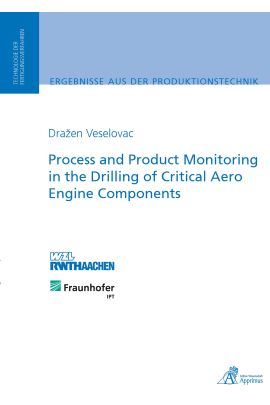Major objective of this thesis was the attempt to find an answer to the question, if under specified boundary conditions signals generated with state of the art monitoring solutions allow an interpretation of the generated part quality during the manufacture of critical aero engine components. It is shown in the state of the art of this thesis, that process monitoring systems are widely used in modern production systems. Their major focus is set onto cutting and machine tool condition monitoring solutions. Various sensor solutions are on the market to monitor manufacturing and production system, but up to now no direct link to the parts quality with the aid of sensor and monitoring systems has been made. Following the need that sensor and monitoring solutions have to be implemented into a rather rough production environment, it is asked, how these environmental issues are influencing the robustness and reliability of the process monitoring system. This question is discussed in this work, where first non-machining related key process variables are defined and analyzed. Following this, the question is raised if major machining characteristics of a drilling process can be monitored and interpreted in such a way, that a correlation to the machined components quality is possible. To answer this, pure machining related anomalies and their influence on sensor signals are discussed. This is undertaken on drilling processes for the two relevant alloys of this thesis, TiAl6V4 and Inconel 718. A broad range of process characteristics and abnormal behavior during a drilling process is identified and described with corresponding sensor signals. A possible evaluation for the creation of signal features is given as an example. Furthermore, an attempt is made to create a correlation of sensor signals to the life of components. As component life is usually evaluated by the use of LCF experiments, this has also been carried out within the thesis work. Various typical anomalies were machined into test blocks, monitored and LCF tested. A monitoring strategy based on this evaluation is also presented. As it was found that temperature evolution within the drilling process is critical a new temperature measurement method has been developed and based on these measurements a temperature model has been derived from the results for drilling the titanium alloy TiAl6V4.
| Autor | Veselovac, Dražen |
|---|---|
| Lieferzeit | 3-4 Tage |
| Gewicht | 0.3 kg |
| Erscheinungsdatum | 28.03.2013 |
Eigene Bewertung schreiben
Technologie der Fertigungsverfahren
Process and Product Monitoring in the Drilling of Critical Aero Engine Components
ISBN: 978-3-86359-112-0
39,00 €
inkl. 7% MwSt.
Kurzbeschreibung
Major objective of this thesis was the attempt to find an answer to the question, if under specified boundary conditions signals generated with state of the art monitoring solutions allow an interpretation of the generated part quality during the manufacture of critical aero engine components. It is shown in the state of the art of this thesis, that process monitoring systems are widely used in modern production systems.
Auf Lager

